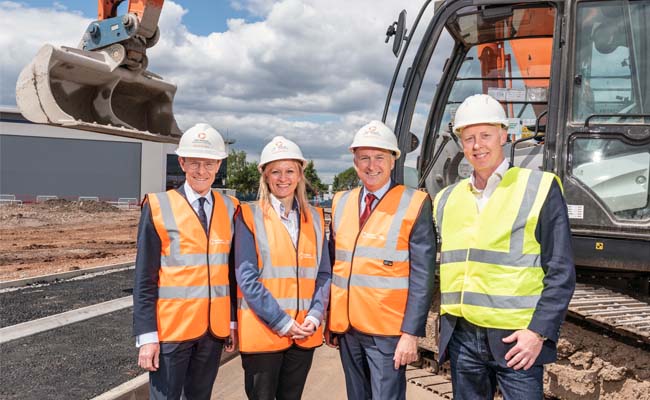More than 4,000 jobs created by fund to kick-start commercial developments

The redevelopment of the historic Joseph Lucas car battery plant in Birmingham is one of the schemes benefiting from WMCA funding; From left: Mayor of the West Midlands Andy Street, Katie Trout of Greater Birmingham and Solihull Local Enterprise Partnership (GBSLEP), Cllr Ian Ward, leader of Birmingham City Council and Nick Oakley of Frontier Development Capital
A multi-million pound war chest to kick-start new commercial property developments and transform acres of former industrial land has helped create more than 4,300 new jobs.
Latest figures show how 186 acres of once-derelict land, the equivalent of more than 92 football pitches, has been brought back into use thanks to a series of loans and grants from the West Midlands Combined Authority (WMCA).
More than £82m in loans has been made available from the WMCA’s Collective Investment Fund (CIF) to help property developers build much-needed commercial, light industrial and regeneration schemes.
The fund has been designed to bring inward investment and employment into the region, by accelerating site regeneration. Once the schemes are completed and a new occupier is confirmed the funding is repaid to the WMCA.
A further £39m in grants has been issued through the Brownfield Land & Property Development Fund (BLPDF) which is used to clean up old industrial sites that would otherwise lie neglected and undeveloped. The BLPDF alone has unlocked more than 112 acres of brownfield land.
A total of two million square feet of new, commercial floor space has been, or is in the process of being, built. Figures also reveal that firms moving into the new premises are generating an extra £5.3m in business rates. Schemes backed by the fund cover a breadth of uses including office, industrial, mixed use schemes and hotels.
Andy Street, Mayor of the West Midlands and the former CEO of retail giant John Lewis, said: “The West Midlands is the fastest growing region outside of London and these figures show how the WMCA is playing its part in driving that growth.
“We are doing this not just through our ‘invest to unlock’ funding but also in the billions of pounds of new transport infrastructure we are building and our initiatives to equip people with the skills they need to fill the new jobs being created.
“The derelict land we are unlocking and the funding we are providing to get these commercial developments off the ground not only creates badly-needed premises for new and expanding firms, but also local jobs for local people.
“Also, by remediating and developing brownfield land, we are protecting and alleviating the pressure on the green belt.”
The CIF was set up by the WMCA in 2016 and initially allocated £70m to stimulate jobs, opportunity and growth, helping to unlock a further £1 billion private sector investment over a 10 year period. The success of the fund saw its pot increased to £140m earlier this year.
The BLPDF was set up in 2017 with £50m by the WMCA to unlock former industrial sites by cleaning up the land and bringing forward investible propositions.
Frontier Development Capital (FDC) provides access to the CIF, via its Property Investment Team.
FDC’s Head of Property Investments, Nick Oakley, said its property investment directors had a combined experience of 55 years’ in corporate banking and real estate, bringing a commercially astute approach to the loan funding.
“What’s unique about this fund is that it is focusing on strategic brownfield regeneration sites that are unlikely to be redeveloped in the short term via normal capital markets,” he said.
“The CIF is acting as a catalyst for the much-needed regeneration of dormant sites that often present challenges in terms of remediating the land.
“From an open-cast colliery in Cannock, to the derelict Joseph Lucas factory in Birmingham, this loan funding is breathing new life into brownfield land that would otherwise lay dormant.
“The jobs created, commercial square footage constructed, and business rates generated all make a significant contribution to growing the region, supporting strong cities and diverse town centres.”
Both the CIF and BLPDF help make up a wider £760m set aside by the authority to kick-start both commercial and residential developments, predominantly on brownfield land.
The WMCA is targeting funding on developments that meet its key goals, including tackling youth and long-term unemployment, securing affordable housing, maximising public transport connectivity and supporting advanced methods of construction.





